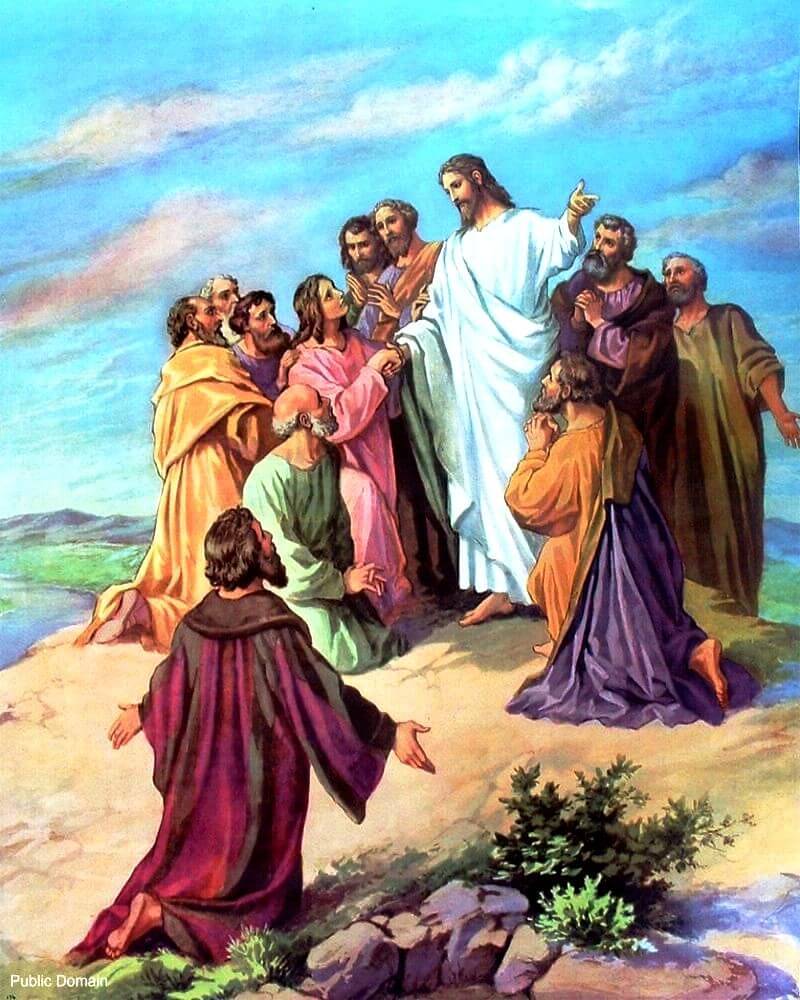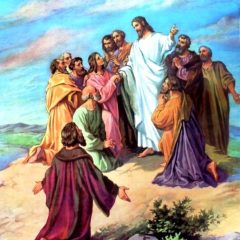great commission
The Trinity: Diverse But United

Trinity Sunday
Fr. Paul Patrick, O.M.I.
Posted: May 29, 2021
- Intro:
Today we celebrate Trinity Sunday. This Sunday was formally added to the Church’s liturgical calendar in the year 1334 by Pope John XXII. It stands out among many of the other special days which we celebrate in the Church since it is not linked to any specific historical or theological event. It is instead a day not unlike a birthday: a day in which we celebrate a person and reflect on our relationship with them. In celebrating Trinity Sunday we celebrate God in 3 Persons – Father, Son and Holy Spirit and reflect on our relationship with God.
- What is the Trinity?
It is important to realize that the Trinity is not a logical explanation of God. It is rather a description of who we know God to be. It is a mystery which we can appreciate, even while failing to understand it. The Church teaches us that God is 3 persons in one nature: in other words, that the Father, the Son and the Holy Spirit together are God. Anything more or less than that is mere speculation on our part.
- Relationship between the Trinity and the Church:
I had a Jesuit professor at the Gregorian University who used this quote from the French aviator Antoine de Saint-Exupery (b.1900) to help understand the relationship of the Trinity to the Church: “If you want to build a ship, don’t herd people together to collect wood and don’t assign them tasks and work, but rather teach them to long for the endless immensity of the sea.”
The relationship we as a living Church have with God in the Trinity is in some sense a longing to deepen and explore the unknown. This endless mystery draws us in and fascinates us. The desire to know and deepen our relationship with God is ultimately what drives our “shipbuilding” or our life of faith in the Church.
- What can meditating on the Trinity teach us?
In today’s Gospel according to St. Matthew, we read about the Great Commission (Mt 28:16-20). In this scene, the disciples are sent to all nations (cf. Mt 28:18). This command is preceded by a revelation (cf. Mt 28:17) and followed by a promise (cf. Mt 28:20) all of which are prefaced by the word “all” giving it universality. Jesus has been given all authority, the disciples are to preach the Gospel and make disciples of all nations, and Jesus will be with His followers through the Holy Spirit all the days.
This universality of the Trinity – which St. Paul speaks about in today’s 2nd reading allows us to recognize God as our Father and to recognize that just as the Trinity are diverse Persons, they are united by the bond of love (cf. Rm 8:14-17). This unity in the midst of diversity is what every baptized Christian is called to. We are all diverse and quite different as individuals, but we are all united and are all one people through our faith.
Thus, Trinity Sunday celebrates what we know to be true: God does not live in isolation but rather in a community of love, a community of relationship. God by His nature is not a recluse. The Trinity inspires us to develop a personal theology which does not run from others into isolation but rather one which seeks to build communion with society. Following the Most Holy Trinity leads us to a worldview which seeks not to retreat away from the world but rather enter into it, with a mind set on transforming what is dark and negative into light and truth through the power of love.
Who Are You?

Feast of the Ascension
Fr. Mark Gatto
Preached: May 24, 2020
Baptism is not something that we receive, it is about who we become and who we are called to be.
Who are we called to be in the light of our baptism?
In baptism, we are reborn by water and the Spirit, therefore we can truly say we are children of God.
In baptism, we are united to Jesus, so we can say that we are brothers and sisters of Jesus.
Baptized in the name of the Father and of the Son and of the Holy Spirit, we are the people of God who dwell within the heart of God, who is a communion of love.
In baptism, the power of the Holy Spirit comes upon us, so that we are to be witnesses of Jesus to the ends of the earth.
In baptism, we entered the church, to be the body of Christ.
Look into the waters of your baptism, see who you are. Child of God, brother or sister of Jesus, lover living in the Holy Trinity, witness of Jesus, member of the body of Christ. What dignity, what beauty, the incredible mystery of who you are. See who you are, not with pride, but with humble gratitude.
The Feast of the Ascension is also about the followers of Jesus coming to see and live who they were called to be. Jesus sends the Apostles out saying, “Go therefore and make disciples of all nations …”
We are disciples of Jesus. We are responsible for continuing the mission of Jesus. To preach the Gos-pel, to bring healing and peace. We are to be instruments of reconciliation, helping each other to be rec-onciled to God and reconciled to one another. Our challenge is to live as disciples of Jesus, sharing in the mission of Jesus.
Someone tells a legend about Jesus’ arrival in heaven. There a vast host of angels greeted him. After the formalities, they asked him whom he had left behind on earth to finish the work he had begun. Jesus replied, “Just a small group of men and women who love me.” “That’s all?” asked the angels, aston-ished. “What if this tiny group should fail?” Jesus replied, “I have no other plans.”
Jesus has no other plans but us. In our baptism, we are called to be disciples of Jesus, to continue the work of Jesus. We are those left to continue the mission of Jesus. We are to preach the Gospel, to bring healing and forgiveness, to be instruments of reconciliation with God and one another. Look deeply into the mystery of Christ, feel yourself within the Holy Trinity, see who you are called to be.
St. Teresa of Avila captures this mystery of who we are in her famous prayer:
Christ has No body on earth but yours; No hands but yours; No feet but yours; Yours are the eyes through which he is to look out Christ’s compassion to the world; Yours are the feet with which he is to go about doing good; Yours the hands with which he is to bless now.

